Key takeaways:
- The ocean is crucial for biodiversity and climate regulation, making its conservation essential for both marine life and human well-being.
- Plastic pollution severely impacts marine ecosystems and human communities, highlighting the need for awareness and action to address this pervasive issue.
- Promoting sustainable alternatives and organizing community initiatives can effectively reduce plastic waste and inspire collective action.
- Personal actions, such as using reusable items and leading by example, can inspire others and create a ripple effect in the community towards a plastic-free lifestyle.
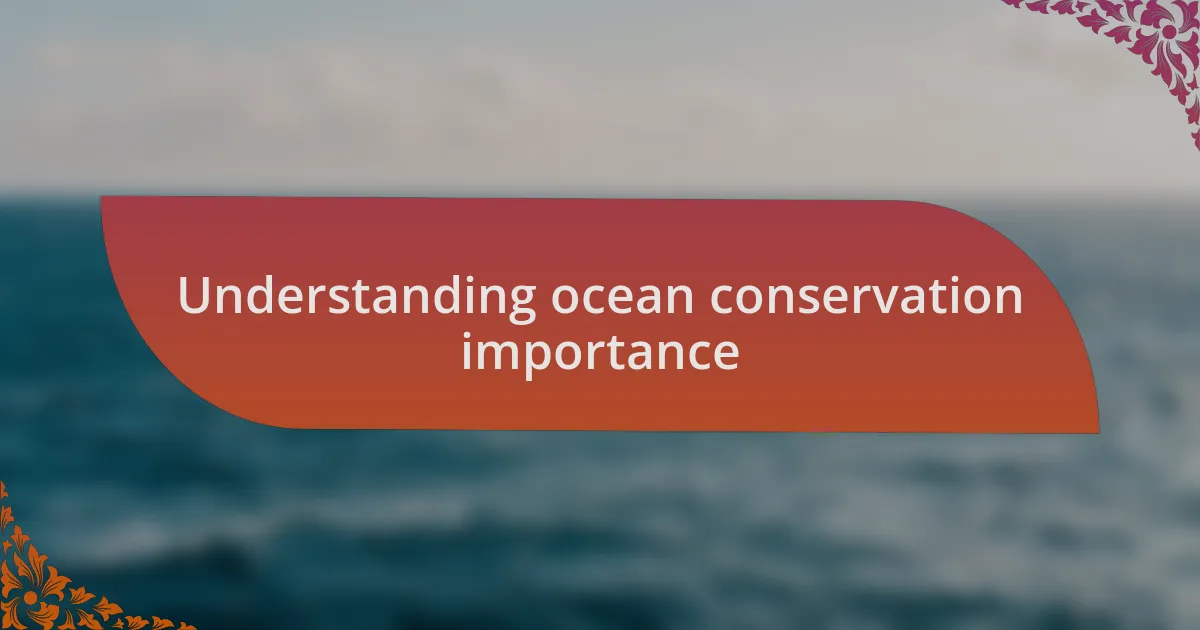
Understanding ocean conservation importance
The ocean, covering more than 70% of our planet, is vital for life as we know it. I often find myself reflecting on the mesmerizing beauty of underwater ecosystems. Have you ever watched a documentary and felt that pang of concern for those vibrant coral reefs? Their decline is a powerful reminder that our actions on land reverberate throughout the sea.
Protecting our oceans goes beyond preserving their beauty; it’s about safeguarding biodiversity that supports countless species, including humans. I recently volunteered for a beach clean-up, and seeing the impact of plastic waste firsthand was heartbreaking. How can we expect marine life to thrive when their homes are shattered by pollution? Every piece of trash removed is a small victory in our fight for ocean health.
Moreover, the oceans play a crucial role in regulating the climate by absorbing carbon dioxide and heat. I still vividly recall a conversation I had with a marine biologist who emphasized how unhealthy oceans contribute to extreme weather patterns. Can we afford to ignore this connection? Understanding the importance of ocean conservation isn’t just academic; it’s personal, affecting the air we breathe and the future we leave for generations to come.
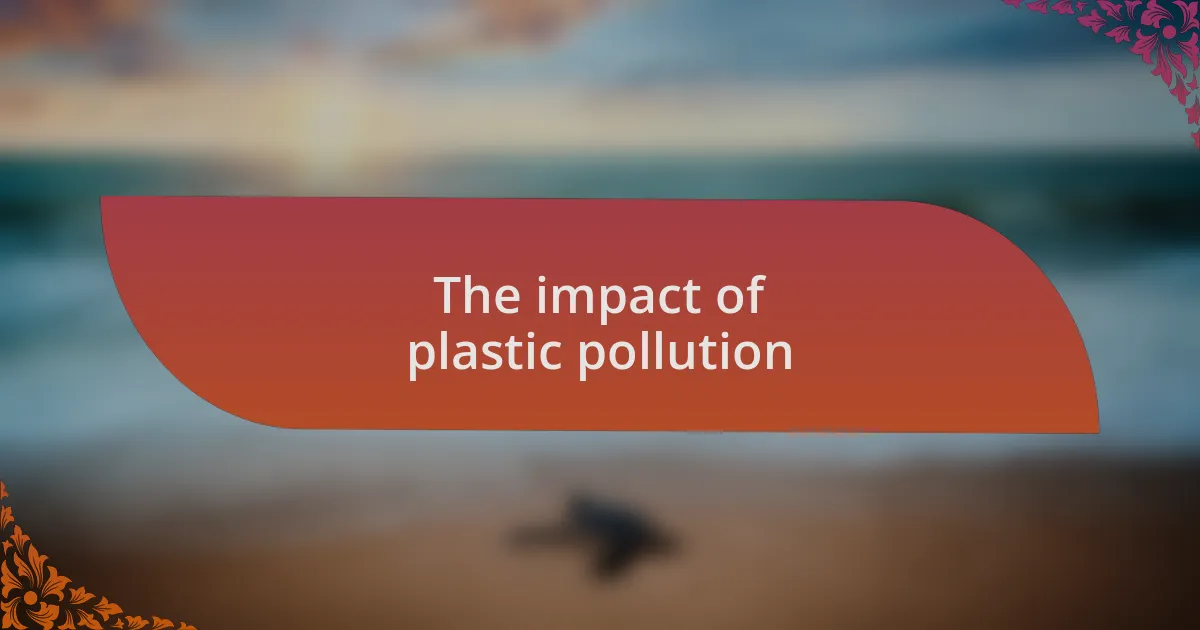
The impact of plastic pollution
Plastic pollution has a devastating impact on marine life. I remember one particular visit to a marine reserve, where I saw a sea turtle trapped in a plastic net. The sight was haunting, as I felt helpless witnessing such a majestic creature struggle. How many other turtles face similar fates? The truth is, our oceans are becoming graveyards for wildlife, filled with the plastic we discard thoughtlessly.
Beyond the immediate dangers to animals, plastic pollution disrupts entire ecosystems. In my exploration of coastal areas, I discovered microplastics—tiny fragments of plastic that are nearly impossible to remove. They infiltrate the food chain, affecting everything from plankton to larger fish species. Isn’t it alarming to think that what we eat can be contaminated by our own waste? This pervasive problem raises critical questions about our responsibility to protect marine environments.
Additionally, plastic waste impacts human communities. After experiencing a polluted beach firsthand, I realized how it affects local economies dependent on tourism and fishing. How can we enjoy our beautiful coastal cities when plastic waste diminishes their allure? The challenges of plastic pollution reach far beyond the shores, affecting health, livelihoods, and the very essence of our connection to the ocean.
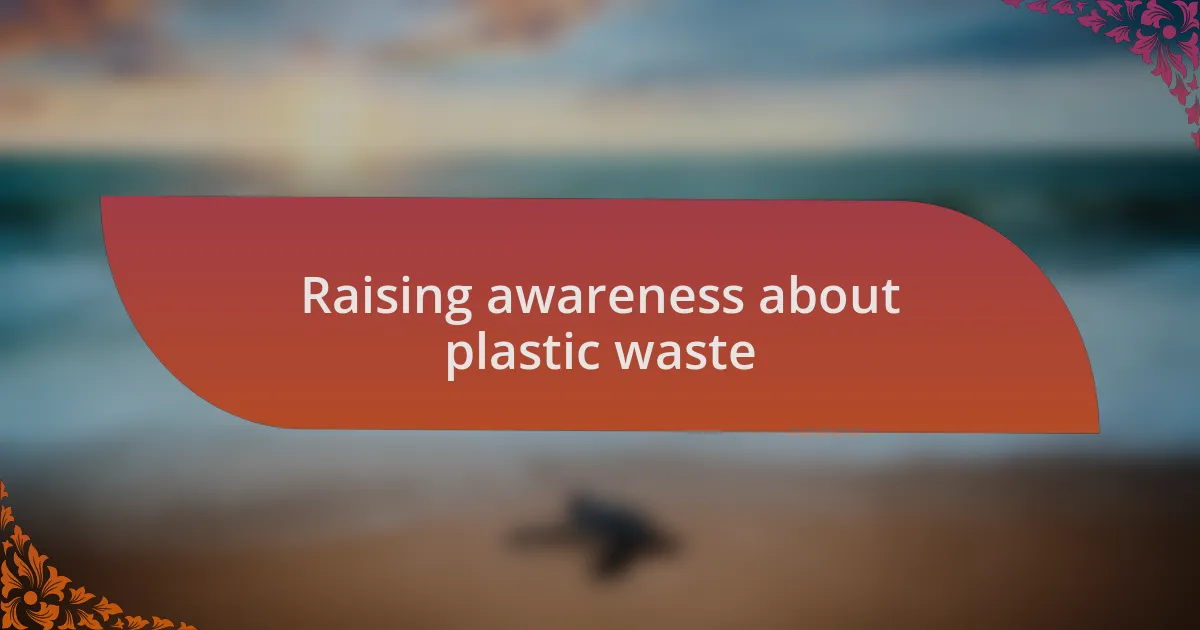
Raising awareness about plastic waste
Many people are simply unaware of the scale of plastic waste we generate. During a recent community cleanup, I was astonished by how much plastic we collected in just a few hours. It made me wonder, how many more hidden spots in our towns and beaches are overflowing with discarded plastics? Raising awareness in our local communities can have a significant impact, inspiring others to take action.
Social media has become a powerful platform for spreading awareness about plastic pollution. I often share posts showing the stark reality of plastic waste in oceans, hoping that the visuals will stir emotional responses. Have you ever felt that gut-wrenching feeling when you see images of marine creatures harmed by plastic? These moments can catalyze change, prompting individuals to reconsider their daily habits.
In conversations with friends and family, I’ve found that sharing my experiences about the dangers of plastic waste can spark curiosity. When I talk about my beach walks, littered with bottles and wrappers, it resonates with them. I always ask, “What legacy do we want to leave behind for future generations?” This question often leads to deeper discussions on solutions and encourages everyone to play a part in reducing plastic waste.
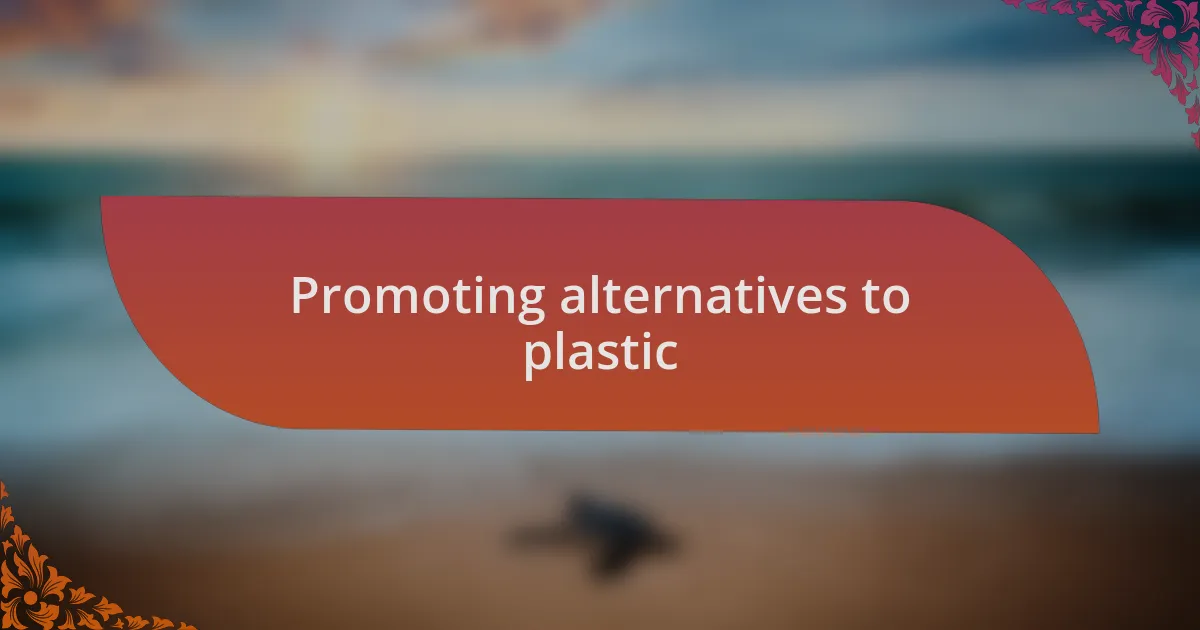
Promoting alternatives to plastic
To effectively promote alternatives to plastic, I’ve started utilizing reusable bags and containers during my grocery shopping. It surprises me how many people still opt for single-use items without considering the consequences. Have you ever stopped to see how quickly those plastic bags pile up in your home? By showcasing my switch to alternatives, I encourage others to think twice about their choices.
In my pursuit of reducing plastic consumption, I often share stories about local businesses that offer sustainable options. One memorable visit was to a nearby café that serves coffee in bamboo cups. It was heartwarming to see how customers responded positively to this eco-friendly change. Could it be that when we support businesses prioritizing sustainable practices, we collectively shift our purchasing power towards a plastic-free future?
Crafting small DIY projects has also become a fun way for me to explore alternatives. I recently made beeswax wraps to replace plastic wrap in my kitchen. Not only do they feel more personal and less wasteful, but they also spark conversations about sustainable living during gatherings. Have you experienced that moment when a simple action becomes a catalyst for discussion? It’s moments like these that open up a dialogue about sustainable habits and push our communities towards a plastic-free lifestyle.
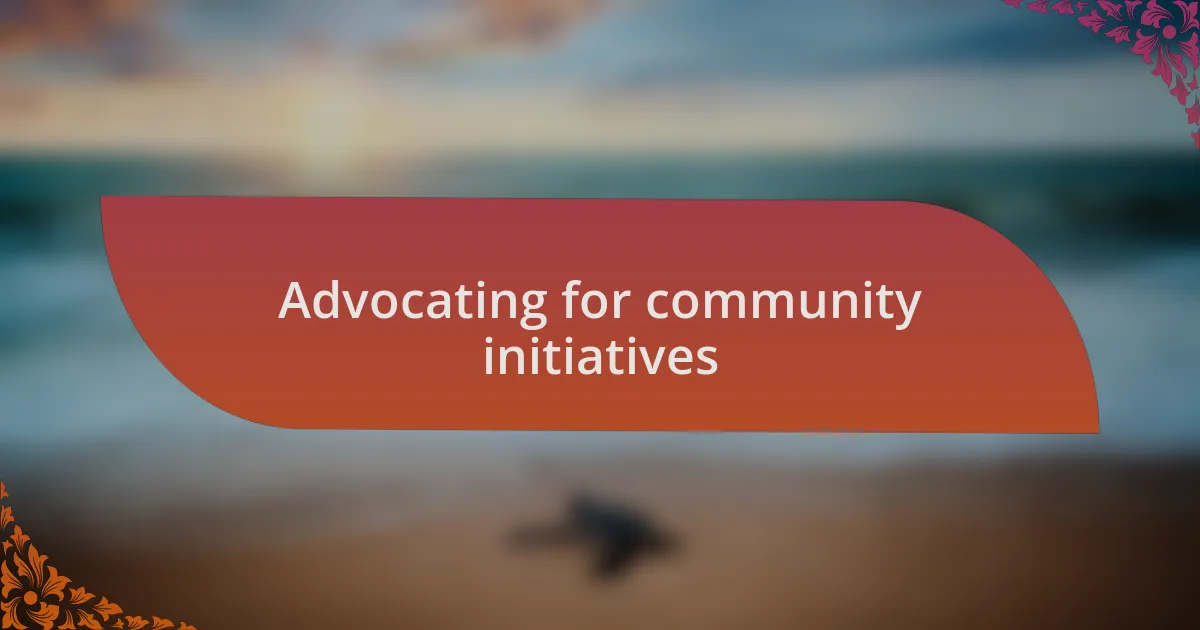
Advocating for community initiatives
When advocating for community initiatives, I’ve found that organizing local clean-up events can create a strong sense of camaraderie and shared purpose. I remember participating in a beach clean-up last summer, where families and friends came together to collect plastic waste. The pride on their faces as we filled bags was palpable, sparking conversations about how each of us can take ownership of our local environment. Isn’t it empowering to witness the impact we can make when we unite for a common cause?
Moreover, I’ve learned that engaging with local schools can be transformative, especially when educating young minds about the dangers of plastic pollution. I volunteered to lead workshops, and I could see the curiosity in their eyes as we discussed the ocean’s health. One student even approached me later to share a project he created about reducing plastic use in lunchboxes. Isn’t it incredible how inspiring the youth can be when they embrace sustainability?
In advocating for community initiatives, involving local government can also amplify our efforts. I attended a town hall meeting where I presented a proposal for banning plastic straws at local restaurants. The supportive feedback I received reminded me that even small changes can have a ripple effect. Have you ever thought about how one voice can encourage a community to adopt more environmentally friendly policies? These experiences reaffirm my belief in the power of collective action to combat plastic pollution.
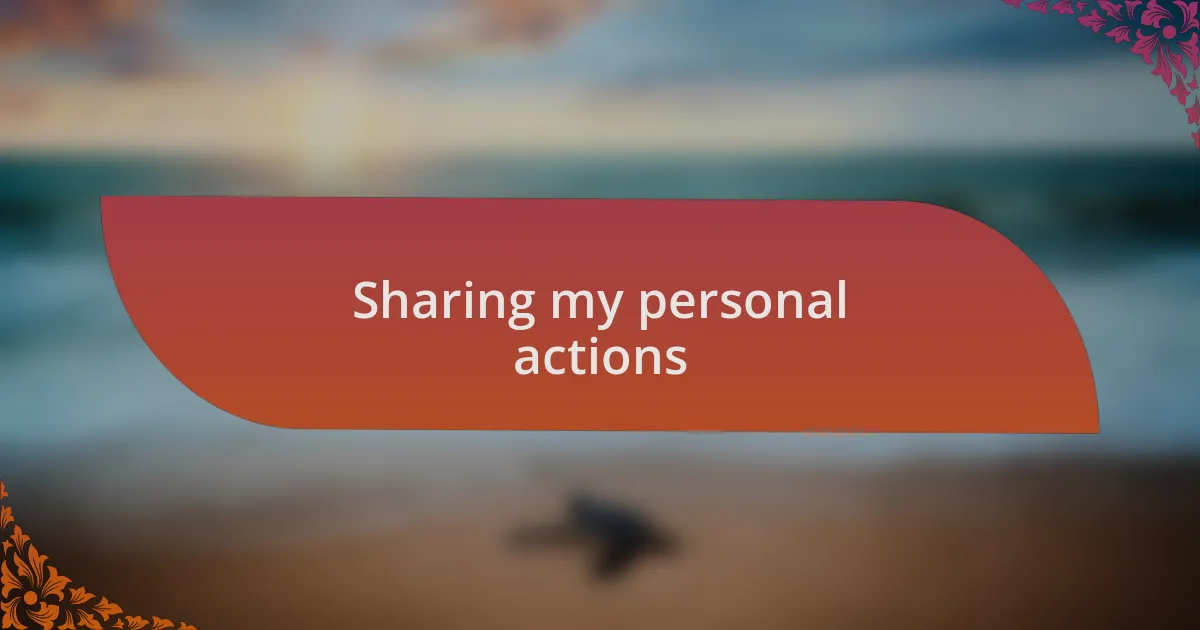
Sharing my personal actions
One of the personal actions I’ve taken to reduce plastic in my daily life is transitioning to reusable alternatives. I remember the first time I brought a cloth bag to the grocery store; it felt like a small victory. I had a sense of pride knowing that I was taking a tangible step towards reducing waste, and I couldn’t help but notice how others looked at my bag with curiosity. It sparked conversations about their own habits, which made me realize that just changing one small behavior can inspire others.
I’ve also made a practice of saying no to single-use plastics whenever possible. For instance, during a recent coffee run, I started carrying my reusable mug everywhere. It was surprising how often baristas perked up at the sight of it; one even offered me a discount for bringing my own cup! This little gesture made me reflect: how often do we overlook simple actions that can ignite change in our everyday interactions?
In my home, I’ve committed to reducing plastic packaging by opting for bulk purchases and avoiding pre-packaged foods. One day, while sorting through my pantry, I realized just how much waste I was generating and decided to overhaul my shopping habits. It’s invigorating to feel empowered by these changes, yet it also brings a poignant question to mind: how can we encourage businesses to adopt more sustainable practices too? Every step we take matters, and sharing our stories can magnify our impact.
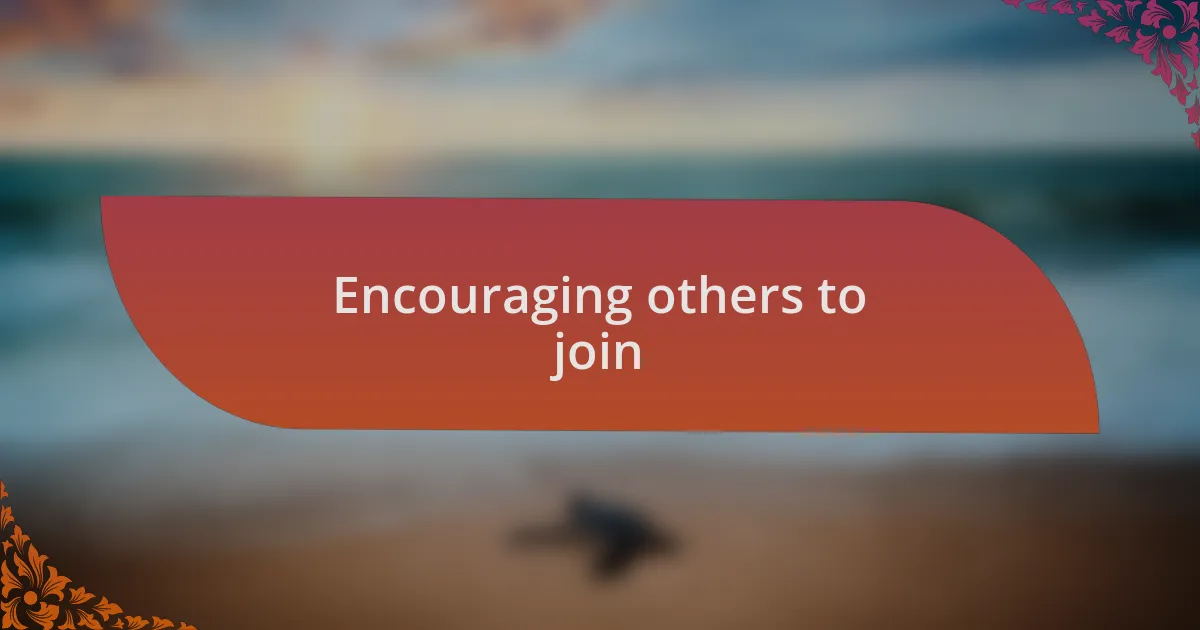
Encouraging others to join
Encouraging friends and family to join my journey towards a plastic-free lifestyle has been one of the most rewarding experiences. I recall hosting a small gathering where I introduced guests to delicious, plastic-free snacks served on reusable platters. The genuine surprise and interest in how easy and enjoyable it was to make these alternatives sparked lively discussions. Isn’t it fascinating how sharing simple experiences can shift mindsets?
Another way I inspire others is by sharing my journey online. I often post photos of my eco-friendly choices or the little victories I achieve, like finding a local market that sells unpackaged goods. I’ve received messages from acquaintances saying how they’ve started making similar choices. It reminds me that even a small online presence can ripple out to inspire change. How comforting it is to know that sharing our stories can foster a supportive community!
Lastly, I try to lead by example, especially in social settings. Once, I organized a beach clean-up with a few friends. Not only did we remove plastic waste from the shoreline, but we also inspired a family enjoying the beach nearby to join in. Witnessing their kids getting excited about picking up trash felt like a spark of curiosity for future eco-conscious actions. Isn’t it heartwarming to see the enthusiasm of new advocates emerging from just one moment of collective effort?